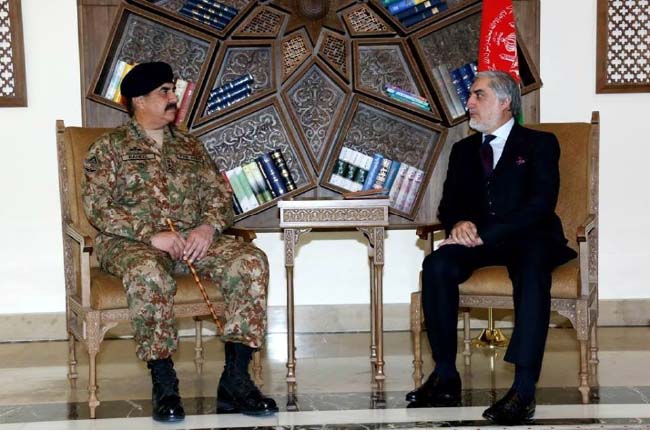During a visit of Pakistan’s army chief General Raheel Sharif to Kabul, Afghan officials and the top Pakistani General reached an agreement for starting fresh efforts for resumption of peace talks in Afghanistan. According to media reports, the two countries will plan to meet US and Chinese officials next month to consider resumption of peace negotiations with the Taliban. The Pakistani General arrived in Kabul on Sunday December 27, 2015, and had meetings with Afghan President Ashraf Ghani and Chief Executive Officer Abdullah Abdullah. A presidential statement released after the meetings between Mr. Sharif and the Afghan leaders said that the two sides agreed to hold the first meeting of officials of Afghanistan, Pakistan, the US and China in next January to develop a comprehensive roadmap for achieving Peace in Afghanistan. According to the presidential office, responsibilities of each party in the efforts for achieving peace in the country will be specified in the roadmap.
The agreement between the two countries comes after a recent visit of President Ashraf Ghani to Islamabad where the two sides agreed on principle to restart the efforts for resumption of peace talks with the insurgent groups. After the meeting, President Ashraf Ghani expressed optimisms of Pakistan’s renewed commitment to assisting the Afghan government resume negotiations with the Taliban. More importantly, Ghani said the Pakistani leaders had promised him of taking action against those militant groups who do not come to table of peace negotiations and shun violence. President Ghani’s visit to Islamabad was agreed between Ghani and Pakistani PM in the sidelines of the climate summit in Paris. Ashraf Ghani’s Islamabad visit was viewed as a considerable breakthrough in the tense relations between Pakistan and Afghanistan after the two countries failed to kick-start a formal and sustainable round of peace negotiations with the Taliban. The efforts to bring Taliban leaders to table of negotiations failed after the first formal meeting between the government of Afghanistan and Taliban representatives was held in Muree, a resort city near Islamabad.
The failure to develop the Muree meeting into a sustainable talks between the Taliban and the Afghan government – which was resulted from the abrupt announcement of the death of Taliban former leader Mullah Omar – was further compounded by the hard-headed insurgency and the Taliban offensives across Afghanistan. With the tense relations between Afghanistan and Pakistan and the surge of violence in the country, President Ashraf Ghani’s initiative for improvement of relations with Pakistan aimed at resumption of peace talks with the Taliban was going to be a failed endeavor. However, there have been concrete progresses in recent weeks as both the Pakistani and Afghan government strive to prepare the ground for resumption of negotiations between the Afghan government and the insurgent groups.
The recent flurry of diplomatic efforts in recent days has given a fresh breath to the hopes for resumption of peace talks among the Afghan government and the Taliban.
On the other hand, Indian Prime Minister’s visit to Afghanistan was also viewed as success for the government of Afghanistan who managed to receive crucial military assistance from the New Delhi to boost the campaign against the insurgency. More importantly, the landmark visit of Mr. Modi to Afghanistan was followed by his visit to Islamabad where the two leaders must have debated, among other things, the Afghan conflict as well.
The visit of the top Pakistani general and his agreements with the Afghan officials suggest a concrete progress in the difficult negotiations between Kabul and Islamabad over many sticky issues related to the peace talks as well as the insurgency going on in the country. According to the Afghan government, the two sides have also agreed that the negotiations should resume only with those groups who are ready to negotiate, and the two countries would work on a framework on how to deal with groups not denouncing violence. Afghan forces are currently battling to push out Taliban insurgents who seized large swathes of the key opium-rich district of Sangin in southern Helmand province. If the two countries manage to reach to a common ground over how to deal with the groups continuing violence across the country, it would be a game changer in the efforts for reaching peace in Afghanistan.
The surge of violence, however, the intensifying insurgency highlights a push by the militants to seize more territory in a bid to wrangle greater concessions during talks. The two countries managed to largely overcome the distrusts of the recent months. Pakistani Prime Minister paid the most glorious welcome to Afghan president Ashraf Ghani when he visited Pakistan. The two countries reached agreements with representatives of world powers and regional players over starting the peace process in Afghanistan. Kabul and Islamabad should also be able to go ahead with the peace efforts in a sustainable manner. For this to happen, Pakistan should remain committed to its promise of taking action against the militants if they refuse to join the peace talks. In the past, the increase of the militant attacks has been a major factor behind the failure of the efforts to resume the peace talks. Both Kabul and Islamabad need to realize that the Taliban needs to be pressurized militarily to be convinced for a peace deal with the Afghan government. It is highly likely that the peace process may once again fail if the Taliban attempts to gain political advantages by waging another wave of war and violence across Afghanistan.

